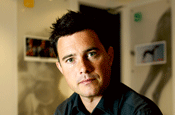.jpg&h=570&w=855&q=100&v=20250320&c=1)
Every year since Joint started in 2012 we’ve taken a contingent to Austin’s interactive conference, South By Southwest (this year's cohort pictured above).
Spending five days immersing ourselves in the future is a fundamental part of our culture and something we find well worth investing in each year.
There’s always myriad diverse innovations and technologies to get excited (and occasionally nervous) about. And this year was no exception.
As usual, people queued for hours to see Amy Webb, who, for the past 20 years, has delivered her Emerging Trends Report.
Her opening line got the room’s attention: “Today is the worst technology will ever be.” We are currently experiencing, she explained, what’s known as a “technology supercycle."
Everyone alive today is going to experience the same extreme transformation. We are all what Amy refers to as “Gen T”. Our society will look totally different after this revolution. It will change the course of human existence.
However, somet ime in the next two years, she says, AI will have run out of the internet. So, where else can data be collected from? Anywhere and everywhere.
There’s going to be a rush to create AI-first “multimodal learning devices” that collect sensory data: Sound, video, images, locations, touch, sight, voice. Enter connectables. We’re about to see a “Cambrian explosion of devices”. A profusion of gadgets that nobody wants or needs (pre-order your Rabbit 1 now for only $199!) but will supply AI with more data from more places.
Face computers will be the next battleground. The first properly functional example, of course, being the Apple Vision Pro.
If anyone doubted we’ll soon be living in an episode of Black Mirror, these connectables will revolutionalise advertising. Look forward to “watch attention coupons." To qualify for discounts on products in supermarkets, people wearing face computers will need to keep watching ads screened within the actual supermarkets. No attention, no discount.
Ethics will be one of the biggest issues to grapple with.
The biggest digital platforms, such as Google and Facebook, have so far managed to remain immune to accountability for posts and will also be immune to accountability for AI-generated content. Blaming the data available to their model rather than the model itself.
What if AI creates an entire deepfake event, complete with press releases, newspaper articles, social posts and videos, causing a global catastrophe? Not their problem.
Peter Deng of Open AI made a good sales pitch for his flagship product, ChatGPT, holding firm to the positive aspects of AI.
AI, he maintains, fundamentally makes us more human. “AI is a great equaliser,” he reckons. “It gives kids a head start by helping them think about problems on a much higher level. It helps less productive people become as productive as more productive people.”
And it means we will all be able to accelerate our careers faster, doing more and choosing what to do with the time we save. Freeing us all up to think about things, giving us time back.
Lisa Su is the chief executive of Silicon Valley’s AMD, a company few of us will have heard of but that’s behind the people behind the people behind the majority of AI. It makes the microprocessor chips used by everyone from the biggest cloud computing giant AWS, to the world’s fastest supercomputer, Frontier.
Su introduced the first AI PC, with a neat summary of its benefits: “AI can let thinkers spend more time thinking and let makers make things faster.”
The opening comment from Ian Beacraft, chief executive of Signal and Cipher, was impossible for the poor human brain to comprehend. By 2029, AI will be 100,000 times better than it is today.
He talked about how we’re moving into the era of the "creative generalist". People who can turn their hand to all manner of tasks without any real training or in-depth expertise.
If you know what success looks like, you don’t need years of expertise to make that happen, you just need to know how to use the right tools.
Huge companies with massive numbers of employees will be seen as relics from the past, Beacraft said, predicting that we’ll soon be seeing the first one-person billion-dollar company.
The future of business will be about creating “small teams that make a massive impact."
Which is, weirdly enough, the exact belief Richard Exon and I had before we launched our own company back in 2012. And the reason we’ve carefully scaled the way we have since 2012. We were visionaries, clearly…
Ray Kurzweil also believes “tomorrow’s going to be better and better”. He’s been working in AI for 61 years, longer than any other human being. And, back in 1999, he predicted that computers would pass the Turing test (a machine’s ability to exhibit the same intelligence as a human) in 2029 and that, by 2045, we would reach what he calls “the singularity” (computing power overtaking that of the human brain).
Kurzweil still stands by his timings, adding that, sometime between 2030 and 2045, our brains will be augmented by computers, becoming a million times more intelligent than today. And “they’ll get backed up just in case our bodies are destroyed in, say, an explosion."
He dropped in one final juicy line for fans of being alive.
If we’re lucky enough to still be here in 2029, we will all reach what he calls “longevity escape velocity." Meaning that “if we are diligent”, technological advances will enable us to live until we’re 500.
I can’t bloody wait to learn what AI will be capable of at SXSW 2529.
Damon Collins is the founder of Joint.



.jpg&h=334&w=500&q=100&v=20250320&c=1)


.png&h=334&w=500&q=100&v=20250320&c=1)



.png&h=334&w=500&q=100&v=20250320&c=1)

.png&h=334&w=500&q=100&v=20250320&c=1)
.jpg&h=268&w=401&q=100&v=20250320&c=1)

.jpg&h=268&w=401&q=100&v=20250320&c=1)



.png&h=268&w=401&q=100&v=20250320&c=1)
